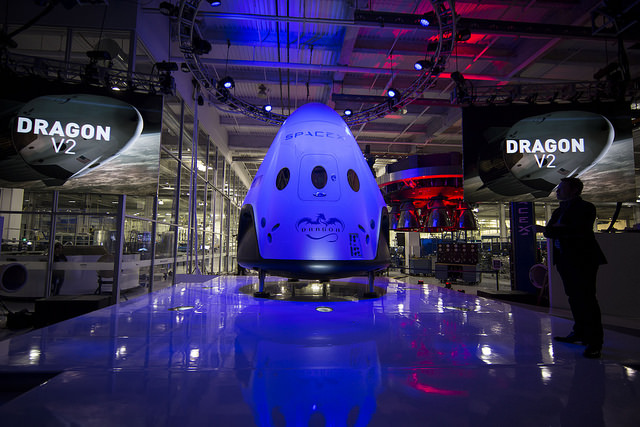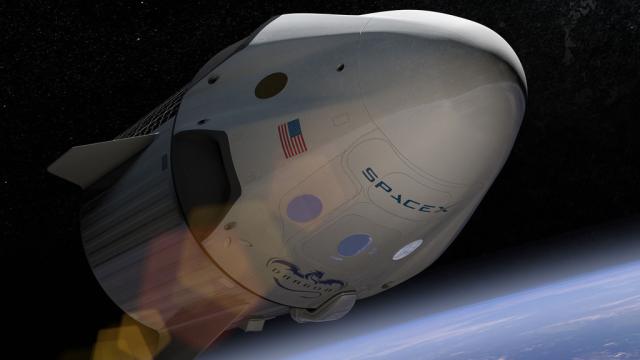Elon Musk wants to take you to Mars, but he also wants your sweet Earthling dollars to do that — hundreds of thousands of them, at least. With SpaceX’s most recent success, in which the company launched a reused rocket into orbital space for the first time ever, Mars enthusiasts and billionaires alike are buzzing to get to the Red Planet.
Image: SpaceX via Flickr
“I hope you’re all thinking about your tickets to Mars,” Gwynne Shotwell, president of SpaceX, told attendees at the 33rd Space Symposium in Colorado Springs this week, according to reporting by Inverse. “[Reusability is] really a tremendous capability, and I highly recommend it for all of you,” she added.
Musk first introduced a $US200,000 ($266,623) price tag for future SpaceX-led trips to Mars on September 2016 at the 67th International Astronautical Congress in Guadalajara, Mexico, in which he discussed his plans to make humans “a multiplanetary species”. The plan relies heavily on SpaceX using refurbished rockets to drive down launch costs, which would hypothetically save Martian tourists some cash, too.
But even with reusable rockets, it’s probably going to cost considerably more than $US200,000 ($266,623) to send humans to live on Mars. Ella Atkins, a professor in the Department of Aerospace Engineering at the University of Michigan, remains sceptical of that figure, especially if it involves sustaining people once they have landed.
“Just from a basic analysis of rockets and gravity, and then doing some back of the envelope calculations on how much you need to take with you to sustain people… 200,000 seems very ambitious,” she told Gizmodo. “But there are some politics here — how many people are going to really going to get behind a company if SpaceX told them, ‘Yeah, it’s going to cost a million dollars to go to Mars.’”

The $US200,000 ($266,623) price tag provides people with a sense of hope. According to Atkins, some dedicated Mars enthusiasts might feel that ticket is attainable if they save up for 20 or 30 years. “I think [SpaceX] is doing what they need they need to do because they want the support of the American people,” Atkins explained. “They want Congress to feel pressured to fund companies like SpaceX… so if they go out and say, ‘Yeah, we’re really just going to take billionaires to Mars,’ that’s not going to make the average congressperson — who has to answer to their non-billionaire voters — want to go out and give lots of money to SpaceX.” Gizmodo reached out to SpaceX for comment but had not heard back at time of writing.
Atkins noted that there’s another cost involved with travelling to Mars, one a $US200,000 ($266,623) price tag may be dramatically underselling: Your life. “The risk of space travel is extremely high,” Atkins said. “I don’t know that people realise just how high it is.”
To be fair, Elon Musk has warned his fans that they should be ready to die for his dream — especially on the first mission. “The risk of fatality will be high,” he told the audience in Guadalajara back in September. “It would be basically, are you prepared to die? If that’s OK, you’re a candidate for going… the probability of death is quite high on the first mission.”
The possibility of a sudden disaster like Apollo 13 or the Columbia tragedy aside, there may be more insidious health effects of a year-long trip to Mars, followed by time on the surface. Early results from NASA’s Twin Study, which analysed astronauts Mark and Scott Kelly, found that Scott’s famous year in space caused changes all the way down to the genetic level. Another recent study found that the volume of grey matter in astronauts’ brains — which is responsible for sensory perception, emotions and other important functions — fluctuated across several areas as a result of both short and long duration spaceflight. Scientists are still working to understand what health impacts these changes might have. Meanwhile, it’s well-established that extended time off Earth can lead to bone mass loss, muscle-wasting, vision changes, and exposure to harmful radiation.
It’s unclear whether or how SpaceX plans to prepare tourists for the possibility that Mars could be a one-way trip, or one with dramatic health consequences that force us to radically alter our biology. Musk previously told Gizmodo this idea was “ridiculous”, adding that “being in deep space or Earth orbit for long periods is far worse than Mars”.
“Astronauts want to do it anyway, because they’re explorers, because they feel like that’s part of the value,” Atkins said. “If it really is the case that we’re just marketing to random people off the streets who expect to come back alive, I feel like there needs to be more realism in the probability that they’re going to come back alive. I feel like that probability is pretty small.”
On some level, we all know that space is risky — shooting a hunk of metal into space, no matter how marvellously designed it is — is inherently bonkers. If someone can afford to spend exorbitant amounts of cash to go to Mars, bon voyage. But no one should tell ordinary folks to start putting their money in a Mars retirement account without being completely honest about the ultimate price involved.
“There will always be someone who really, really wants to go that much,” Atkins said. “But the community needs to be honest about what that’s going to mean.”
